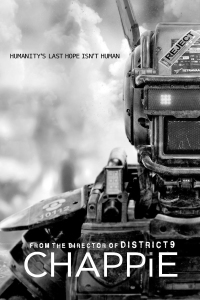‘Chappie’: Filled with heart but lacking life
JASON PEUGH
CONTRIBUTOR
Welcome to the Johannesburg, South Africa of the not-so-distant future. A city with a rapidly-decreasing crime rate thanks to the deployment of police Scouts: bullet-proof, robotic law enforcement officers programmed to protect and serve the citizens of Johannesburg.
Invented by engineer Deon Wilson and produced by weapons manufacturer Tetravaal, the Scouts are a technological masterpiece. They are capable of analyzing and understanding situations and dealing with them with the same finesse and expertise as an experienced field officer.
This is the world created in director Neill Blomkamp’s latest production “Chappie.” In this world, scientist Deon, played by Dev Patel from “Slumdog Millionaire,” uses his technological talent to bestow consciousness onto a police Scout sentenced for demolition.
Meanwhile his work rival Vincent Moore, played by Hugh Jackman, labors to destroy the advances that Deon has made due to their fundamental disagreements regarding the role of Artificial Intelligence in the world. Deon and some local gangsters, played by Ninja and Yo-Landi Visser, must parent and teach their newly conscious machine, Chappie, voiced by Sharlto Copley.
While “Chappie” does provide some emotional moments, intense action sequences, and a few chuckles here and there, overall it was a bit of a letdown. The human characters come across as extremely flat, with few showing any emotional depth and very few having decipherable or rational motivations behind their actions.
The conflicts are bland, coming from such basic places like simple professional jealousy or such overdone themes like the fear of the advancement of artificial intelligence. We’ve already seen this concept in movies like “2001: A Space Odyssey” (1968) and “The Terminator” (1984). We will continue to see these themes prominently appear in the near future with films such as “Avengers: Age of Ultron,” “Ex Machina,” and “Terminator: Genisys,” all to be released in 2015.
The only character whose progression was anywhere near notable was Chappie, the sentient robot after whom the film is titled. His childlike innocence and curiosity in the world around him appeals to the parental sense of viewers.
The audience is proud of Chappie’s first words and is furious when his innocence is taken advantage of or when he is wronged, as any parents would feel toward their own child. And while some holes exist in the logic of Chappie’s rate of learning, he is still far and away the most developed character of the film.
An important aspect in the film is the influence Ninja and Yo-Landi Visser have overall. They bring an interesting sound and perspective on culture to the movie that couldn’t be otherwise achieved.
Ninja and Yo-Landi are two of three members of the South African rap-rave group, “Die Antwoord.” This translates to “the answer” in Afrikaans, and these two play characters remarkably similar in appearance and attitude to their stage personas. Not only that, but they also can be seen wearing clothing advertising their music group in the film.
Die Antwoord contributes the majority of the songs to the film’s soundtrack. Their style of lower class royalty, referred to as “zef,” heavily influences the design and atmosphere of the world of the film. It even has an impact on the behavior of other characters in the film, namely Chappie.
Despite the poorly written characters and general lack of originality of the film, the adorable construction of the character Chappie, the intriguing presence of Die Antwoord’s influences, and the uplifting message of the importance of looking beyond externalities makes the movie somewhat tolerable to watch.
Some of the action scenes are interesting, but tough to enjoy with cheap symbolism being thrown in your face for the entire movie. Overall it deserves a 5 out of 10.
